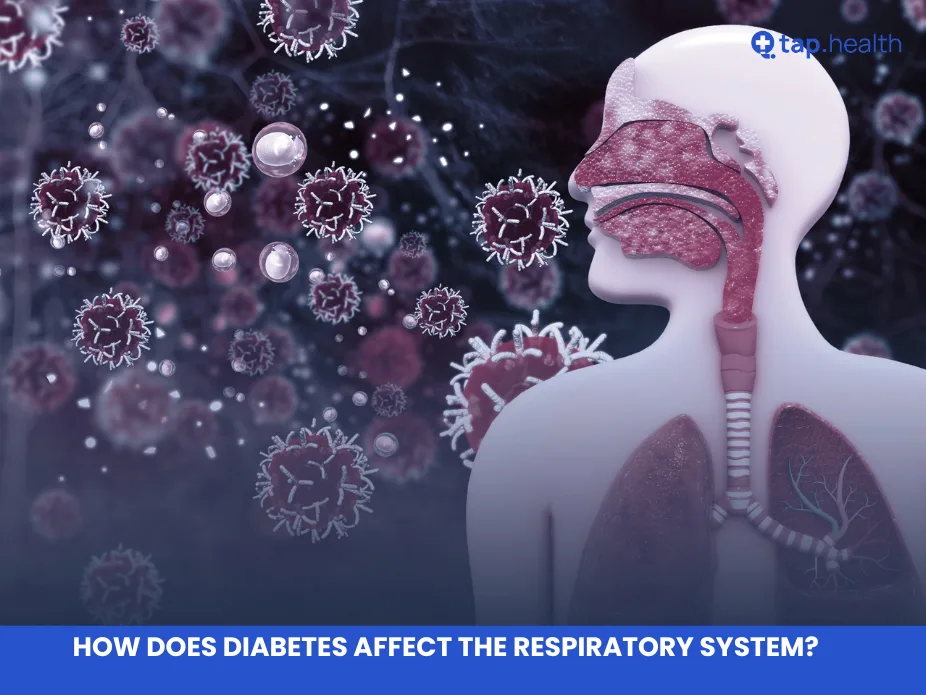Diabetes is a condition that affects multiple parts of the body, but one area often overlooked is the respiratory system. How does diabetes impact our ability to breathe, and what does this mean for people living with the condition? This blog breaks it down into simple terms to help you understand the connection between diabetes and respiratory health, backed by expert insights and real-life stories.
What Is Diabetes and How Does It Relate to the Lungs?
Diabetes, whether Type 1 or Type 2, is characterized by high blood sugar levels. Over time, elevated glucose levels can damage blood vessels, nerves, and tissues throughout the body—including the lungs.
The lungs play a crucial role in oxygenating the blood and removing carbon dioxide. When diabetes disrupts this process, it can lead to reduced lung function and increase the risk of respiratory illnesses.
How Does Diabetes Affect the Respiratory System?
1. Reduced Lung Function
Research shows that people with diabetes often experience a decline in lung function. This happens because high blood sugar levels cause:
- Stiffening of lung tissues: This makes the lungs less elastic, reducing their ability to expand and contract.
- Inflammation: Chronic inflammation due to diabetes can lead to airway damage and reduced efficiency in oxygen exchange.
2. Increased Risk of Infections
Diabetes weakens the immune system, making it harder for the body to fight off respiratory infections like pneumonia, bronchitis, and the flu. These infections can be more severe and take longer to recover from in people with diabetes.
3. Respiratory Conditions Linked to Diabetes
- Chronic Obstructive Pulmonary Disease (COPD): Studies suggest a higher prevalence of COPD in individuals with diabetes, likely due to shared risk factors like inflammation and oxidative stress.
- Obstructive Sleep Apnea (OSA): Diabetes increases the risk of OSA, a condition where breathing repeatedly stops and starts during sleep, leading to poor oxygenation and fatigue.
Read also this – what causes inflammatory bowel disease
Real-Life Scenarios
Priya’s Experience with Diabetes and Breathing Issues
Priya, a 45-year-old homemaker from Hyderabad, had been managing Type 2 diabetes for years when she noticed she was constantly out of breath. “Even walking up the stairs felt like a marathon,” she recalls.
After consulting her doctor, Priya learned that her high blood sugar levels were affecting her lung function. By improving her blood sugar control through medication, diet, and exercise, Priya regained much of her energy and reduced her shortness of breath.
Her story shows how paying attention to respiratory symptoms can lead to timely interventions and better quality of life.
Expert Contributions
Insights from Dr. Anil Mehta, Pulmonologist
Dr. Anil Mehta, a pulmonologist based in Mumbai, emphasizes the importance of regular respiratory evaluations for people with diabetes.
“Many patients with diabetes don’t realize their breathing issues might be related to their condition. We recommend pulmonary function tests for diabetic patients showing signs of reduced lung capacity or recurrent infections,” explains Dr. Mehta.
Dr. Mehta also stresses the importance of vaccines like the flu shot and pneumococcal vaccine for people with diabetes to prevent severe respiratory complications.
Recommendations Grounded in Proven Research and Facts
Here’s how to manage diabetes effectively to minimize its impact on the respiratory system:
1. Control Blood Sugar Levels
Poorly controlled blood sugar is the root cause of most diabetes-related complications. Work with your healthcare provider to monitor and maintain optimal glucose levels.
2. Stay Physically Active
Regular exercise not only helps manage diabetes but also improves lung capacity and strengthens respiratory muscles. Activities like walking, swimming, or yoga are excellent options.
3. Get Vaccinated
Vaccines can help prevent severe respiratory infections. Talk to your doctor about getting annual flu shots and pneumococcal vaccines.
4. Quit Smoking
Smoking exacerbates respiratory issues and increases the risk of COPD and other lung diseases, especially in people with diabetes.
5. Monitor Respiratory Symptoms
Pay attention to signs like shortness of breath, persistent coughing, or wheezing, and consult a doctor if they persist. Early detection can prevent serious complications.
Factual and Reliable Information
Here are some key facts about the link between diabetes and respiratory health:
- Lung Function Decline: Studies show that diabetes is associated with a reduction in lung volume and airflow.
- Infection Risks: People with diabetes are more likely to develop and face complications from respiratory infections.
- Shared Risk Factors: Inflammation, oxidative stress, and poor circulation link diabetes with many respiratory conditions.
For more in-depth information, visit this reliable source from the American Diabetes Association.
FAQs on How Does Diabetes Affect the Respiratory System?
Q1: Can diabetes directly cause lung diseases?
A: While diabetes doesn’t directly cause lung diseases, it increases the risk of respiratory conditions like COPD, asthma, and sleep apnea.
Q2: How can people with diabetes protect their lungs?
A: Controlling blood sugar levels, getting vaccinated, staying active, and avoiding smoking are key steps to protect lung health.
Q3: Are breathing issues reversible in diabetes?
A: In some cases, improving blood sugar control and adopting a healthier lifestyle can reduce symptoms like shortness of breath. However, permanent damage may require specialized treatments.
Q4: Is shortness of breath a sign of diabetes?
A: While not a common symptom of diabetes itself, shortness of breath can occur due to complications affecting the lungs or heart.
Q5: Should people with diabetes avoid exercise if they feel breathless?
A: It’s essential to consult a doctor before starting any exercise program, especially if you experience breathlessness. Moderate activity, under supervision, is often beneficial.



